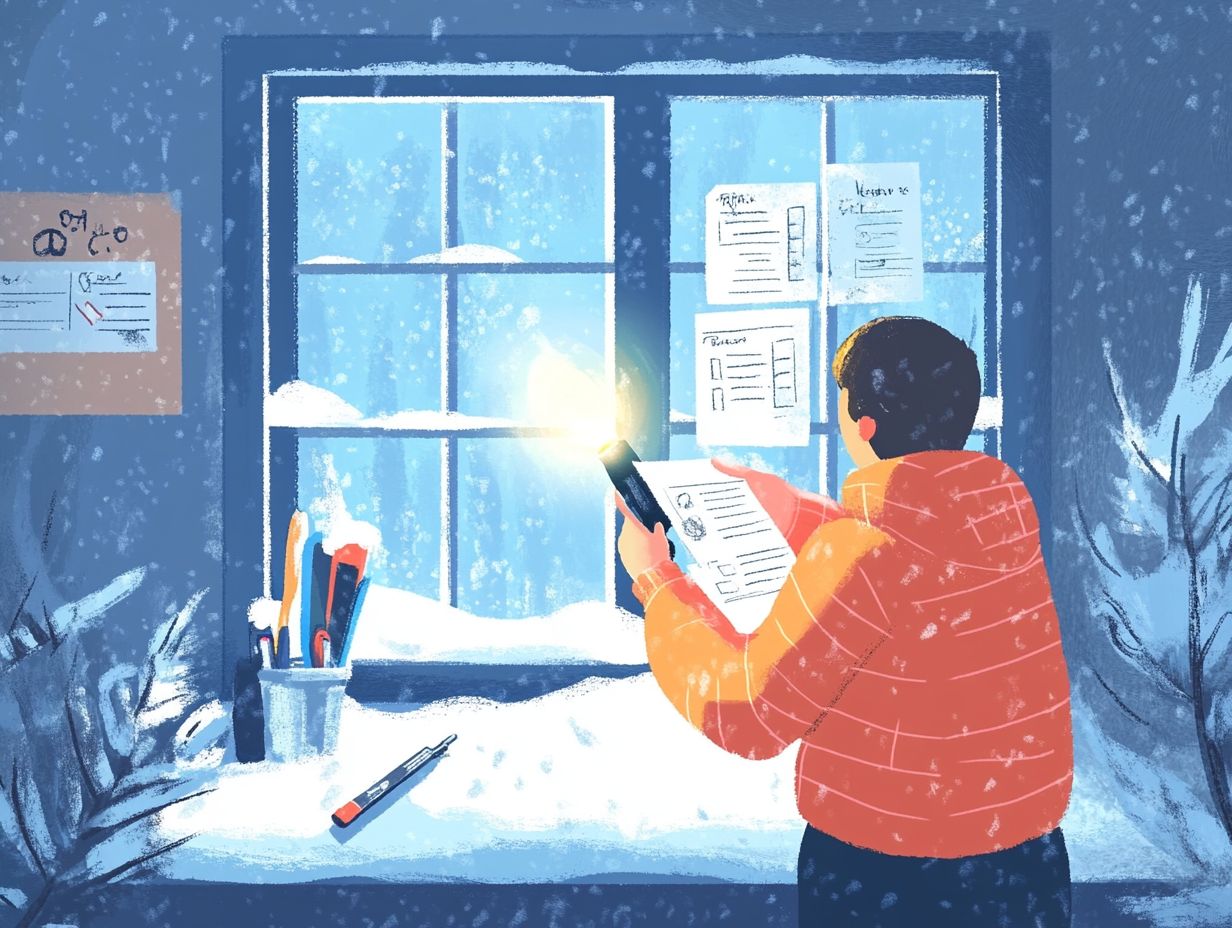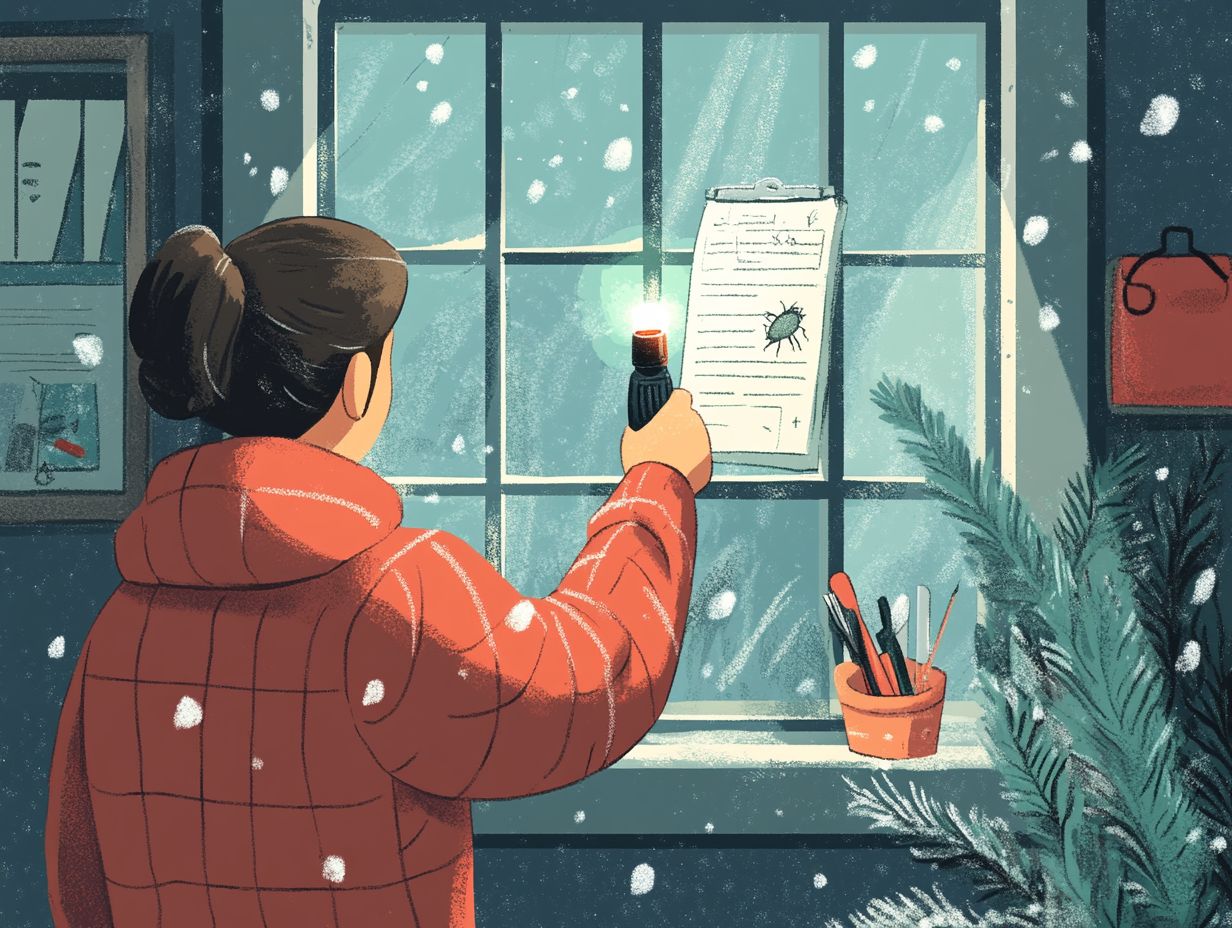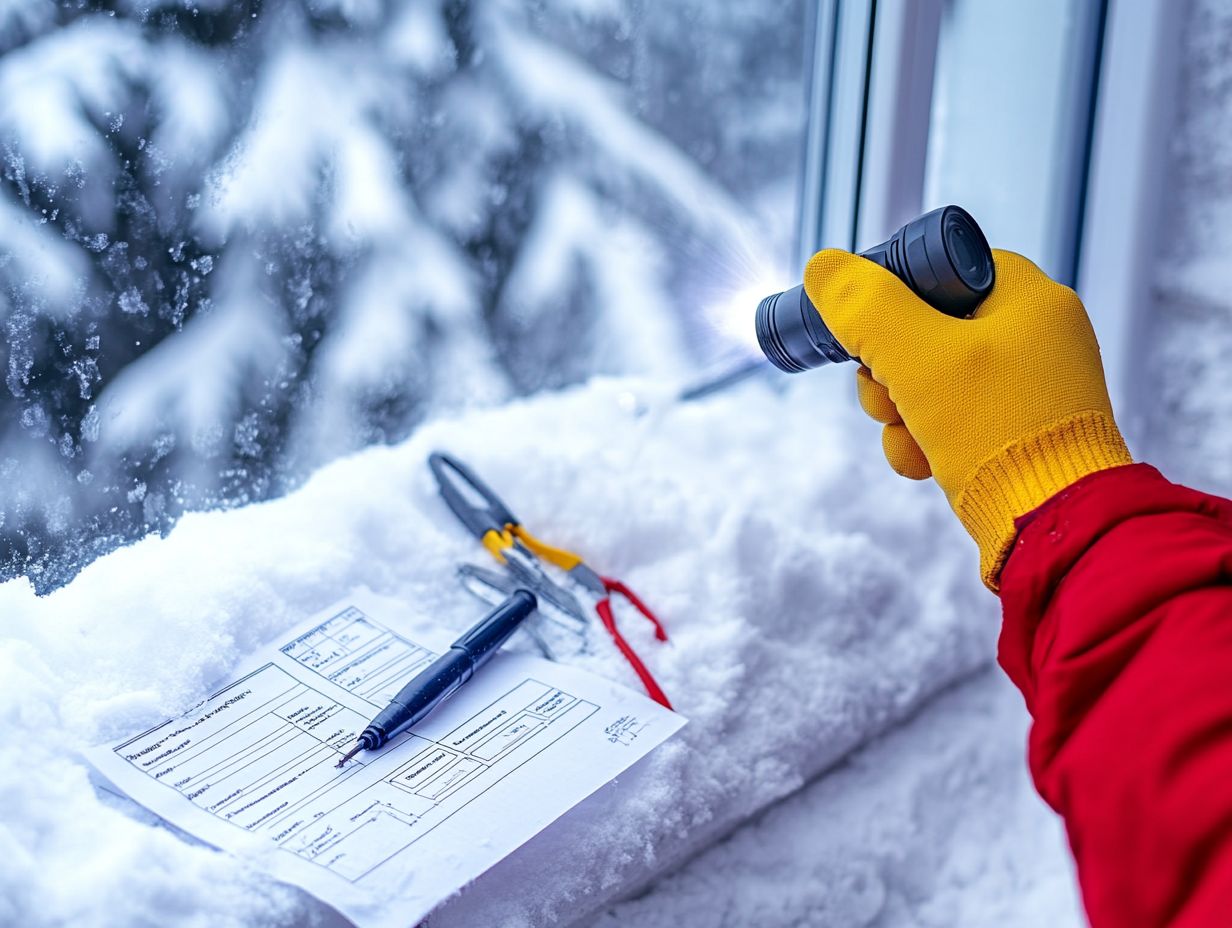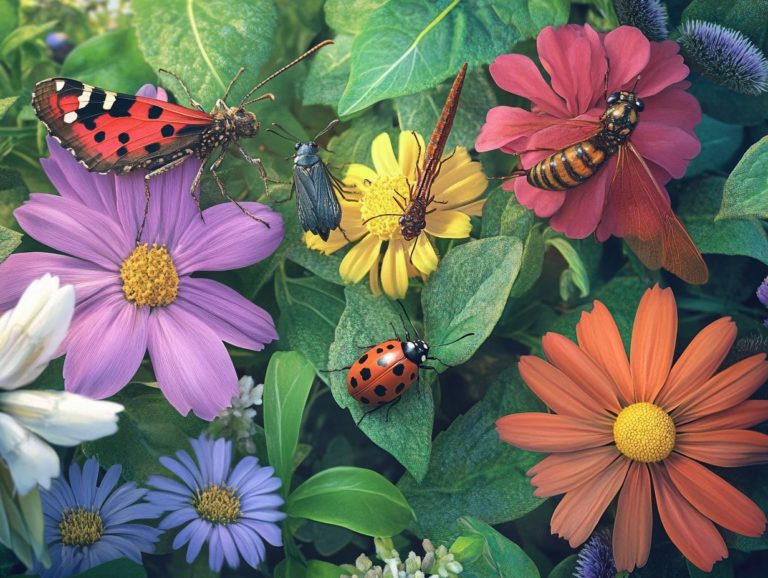5 Steps for Successful Winter Pest Control
As winter envelops your surroundings, it’s easy to overlook that pests remain a concern during these colder months. While some critters may choose to hibernate, others actively seek warmth and shelter within the comfort of your home.
Get ready to protect your home! Here are essential steps to keep winter pests at bay. From pinpointing potential entry points to exploring natural pest control methods, and knowing when it s time to call in the professionals, a variety of strategies await your consideration.
Act now to keep your home cozy and pest-free all winter long!
Contents
- Key Takeaways:
- 1. Inspect Your Home for Potential Entry Points
- 2. Seal Any Cracks or Holes
- 3. Keep Your Home Clean and Clutter-Free
- 4. Use Natural Pest Control Methods
- 5. Call a Professional Pest Control Service
- Why Is Winter Pest Control Important?
- Frequently Asked Questions
- What are the 5 steps for successful winter pest control?
- Why is addressing pest control important during winter?
- How can I identify potential entry points for pests?
- What are common food sources for pests in winter?
- How can I reduce moisture in my home to prevent pests?
- Are preventative treatments necessary for winter pest control?
Key Takeaways:

- Inspect your home regularly to identify potential entry points for pest activity during the winter months.
- Seal any cracks or holes in your home’s exterior to prevent pests from entering and infesting your space.
- Maintain a clean and clutter-free home to eliminate hiding spots and food sources for pests in the winter.
1. Inspect Your Home for Potential Entry Points
Inspect your home thoroughly for entry points. This is essential for keeping pests away, especially during winter when unwelcome visitors like rodents and boxelder bugs are looking for warmth and shelter indoors.
Check various areas in your home, including doors and windows. Make sure they re properly sealed and equipped with screens to keep those pesky insects at bay. Examine your foundation for any cracks or gaps that could serve as highways for critters.
Regularly assess your insulation, the material that keeps your home warm, to prevent pests from finding places to hide. Keeping your yard tidy and removing debris also helps minimize attractions.
Monitoring for signs of infestation early on is crucial. Catching pest issues before they escalate can save you from dealing with severe infestations that might require costly remediation efforts.
2. Seal Any Cracks or Holes
Sealing any cracks or holes in your home is an essential step in pest prevention. This significantly reduces the risk of winter nuisances like mice, spiders, and raccoons from making an unwanted entrance.
You have a variety of effective materials to seal those openings, such as:
- Weather stripping for doors and windows
- Expanding foam for larger gaps
- Caulk for minor cracks
Pay special attention to areas like window frames, door thresholds, and plumbing entry points, as these often act as gateways for unwelcome guests. By addressing these vulnerabilities, you can enjoy long-term benefits, including improved energy efficiency and a significant reduction in pest-related issues, leading to a healthier living space.
3. Keep Your Home Clean and Clutter-Free
Maintaining a clean and clutter-free environment is crucial for effective pest management. It deters unwanted guests and minimizes habitats where pests like cockroaches and ants thrive.
Regular vacuuming is essential; it removes crumbs and debris that attract these unwelcome visitors. Store food properly in airtight containers to drastically reduce the chances of infestations, as many pests are drawn to even the smallest food remnants.
Decluttering spaces, particularly around kitchens and dining areas, further reduces hiding spots for pests. By implementing these straightforward cleaning strategies, you can foster a safer, healthier living environment and maintain food safety, ultimately leading to a noticeable reduction in pest activity.
4. Use Natural Pest Control Methods

Natural pest control methods work well to keep pests away. They are safer for your family and pets.
These eco-friendly alternatives include essential oils like peppermint or lavender. These scents deter pests effectively.
Diatomaceous earth is a natural powder that damages insects’ exoskeletons. Traps are another safe option to catch pests without harmful chemicals.
By incorporating these methods into a comprehensive pest control program, you enhance your overall effectiveness and cultivate a holistic approach to maintaining a pest-free home.
5. Call a Professional Pest Control Service
If pests keep coming back, it’s time to call a pro. They can offer tailored solutions to meet your needs.
Look for providers that specialize in pests common in your area and offer detailed pest activity logs.
These professionals often provide customized solutions to tackle your unique pest challenges. Ensure treatments are both efficient and environmentally friendly.
Why Is Winter Pest Control Important?
Winter is a critical time for pest control, as pests like squirrels, mice, and boxelder bugs often seek warmth indoors. Understanding the importance of winter cleanup for pest control can help prevent these unwanted visitors.
Many pests nest in attics or walls during winter. This can lead to serious problems, like damaging your property or contaminating food.
With 21 million homes facing rodent issues each winter, regular inspections are vital to prevent infestations.
Implementing preventive measures can dramatically reduce the likelihood of pests. For effective strategies, consider following the best practices for winter pest control. Stay vigilant during these colder months!
With proper winter pest control and moisture control, you can achieve effective pest control in cold climates, protecting your home and ensuring a healthier living environment for everyone.
What Are the Most Common Winter Pests?
Common winter pests include mice, squirrels, boxelder bugs, and spiders. Understanding their habits is key to keeping your home pest-free.
Mice search for warmth and food, squeezing through tiny openings. Squirrels often nest in attics, making themselves at home.
Boxelder bugs are identifiable by their black bodies and orange markings, often clustering in sunny spots. Spiders may find refuge indoors, preying on other pests.
Seal entry points and maintain cleanliness to keep these winter invaders out. For more effective strategies, consider preventing indoor pests during winter. This will help you enjoy a pest-free home all season long!
What Are the Dangers of Winter Pests?

Winter pests present a range of dangers that you can’t afford to ignore. They bring health risks through potential disease transmission.
These pests can cause significant property damage from infestations and disrupt your home maintenance routines. Timely pest removal is essential for any homeowner.
Pests look for warmth indoors. They can bring harmful germs that cause respiratory problems and foodborne illnesses, posing serious health threats to your family.
Infestations can wreak havoc on insulation, wiring, and wooden structures. This can lead to costly repairs that spiral out of control if not addressed quickly.
As a homeowner, staying vigilant is key. Look for signs of pest activity, such as droppings, gnaw marks, or unusual sounds.
These can indicate an impending infestation. By implementing preventive measures like sealing entry points, maintaining a clean environment, and utilizing traps, you can significantly reduce the risk of winter pests. Following best practices for pest monitoring in winter can further enhance your efforts.
How Can You Prevent Winter Pests from Entering Your Home?
Prevent winter pests from invading your home by following 5 steps to a pest-free winter garden. Use effective strategies and maintain your property regularly.
This includes sealing any openings, conducting regular property inspections, and ensuring a clean living environment to discourage pests.
Start by thoroughly inspecting your property for cracks or gaps, especially around windows and doors. These serve as unwelcome entry points.
Seal these openings with caulk or weatherstripping to dramatically decrease the chances of pests getting in.
Store your food securely in airtight containers. Even the tiniest crumbs can be an irresistible lure for various critters.
Make it a habit to regularly monitor your home for signs of infestations, such as droppings or gnaw marks. Keeping a pest activity log helps.
Early detection allows you to take prompt action. This ensures you maintain a pest-free sanctuary throughout the colder months.
What Are the Benefits of Using Natural Pest Control Methods?
Utilizing natural pest control methods offers a multitude of benefits. These solutions are both eco-friendly and safe for your family.
This approach reduces your exposure to harmful chemicals often found in traditional pest treatments.
By using ingredients such as diatomaceous earth, essential oils, and homemade sprays, you can deter common nuisances like ants, roaches, and aphids.
These alternatives address the issue while contributing to a healthier ecosystem, promoting biodiversity. Many natural pest solutions are less toxic to beneficial insects, allowing essential pollinators like bees to thrive.
Choosing safe, sustainable pest control brings a sense of peace of mind. It enhances your living space and fosters environmental stewardship in your community.
When Should You Hire a Professional Pest Control Service?
Hiring a professional pest control service is essential when dealing with severe infestations or ongoing pest activity that DIY methods can’t manage. If unique pest strategies are required, it’s time to call in the experts.
Home remedies and over-the-counter products often fall short. Subtle signs like gnaw marks, droppings, or chewed wiring can indicate a growing issue that needs your immediate attention.
If the infestation is larger than what basic traps or sprays can handle, it’s a clear sign to seek expert help.
Professional pest control addresses not just the visible problem but also the root cause. Better tracking methods can help prevent future occurrences, leading to a more sustainable solution for your pest issues.
Frequently Asked Questions

What are the 5 steps for successful winter pest control?
The 5 steps include identifying entry points, eliminating food sources, reducing moisture, sealing gaps, and using preventative treatments. Consider conducting a thorough energy audit to enhance moisture control.
Why is addressing pest control important during winter?
Pests look for shelter and food in winter. Ignoring the issue can lead to infestations and damage to your home.
How can I identify potential entry points for pests?
Inspect your home for gaps, cracks, or holes in the walls, foundation, and windows. Even the smallest openings can allow pests to enter.
What are common food sources for pests in winter?
Pests are attracted to crumbs, garbage, and pet food. Keep your home clean and store food properly to reduce pest attraction.
How can I reduce moisture in my home to prevent pests?
Fix leaks, use a dehumidifier, and ensure proper ventilation. Pests thrive in high moisture areas.
Are preventative treatments necessary for winter pest control?
Yes, preventative treatments help keep pests away in winter. For more effective methods, consult a professional pest control service or explore 5 strategies for indoor plant pest control to find the best plan for your home.






